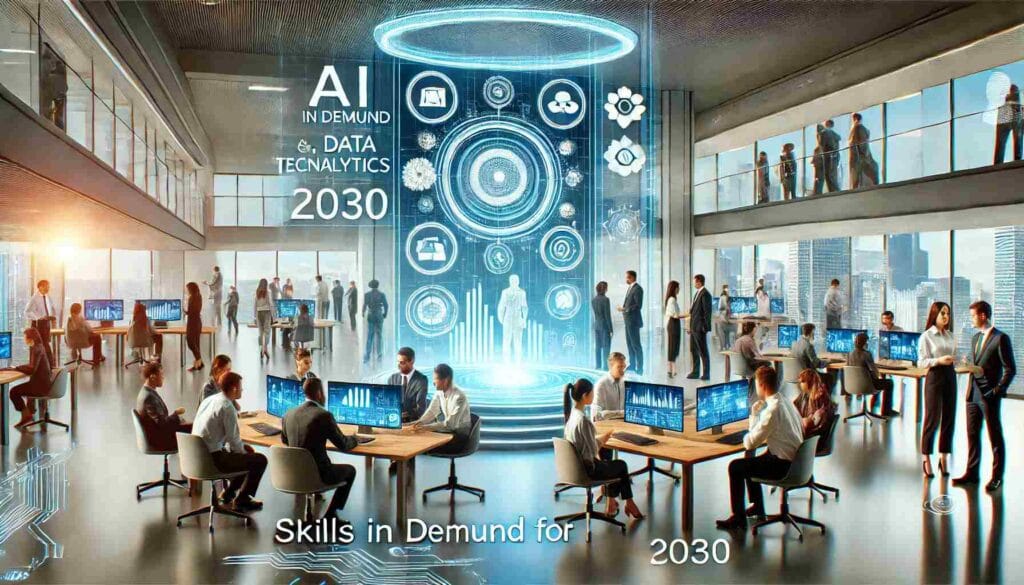Skills That Will Be in Demand in 2030

As we move toward 2030, the global workforce is expected to undergo profound changes, driven by advancements in technology, shifts in global markets, and evolving social needs. To thrive in the future, individuals will need to cultivate a unique set of skills that align with these trends. Here’s a breakdown of the key skills that will be in high demand by 2030.
1. AI and Machine Learning Expertise
Artificial intelligence (AI) and machine learning (ML) are already shaping industries across the world, from healthcare to finance. By 2030, these technologies will be even more integrated into daily operations. Professionals who can design, implement, and optimize AI systems will be highly sought after. Understanding AI’s ethical implications and biases will also be critical for developing responsible solutions.
2. Data Literacy and Analytics
Data is considered the “new oil” of the 21st century. As businesses continue to generate enormous amounts of data, the ability to analyze, interpret, and derive meaningful insights from that data will become indispensable. Data scientists, analysts, and engineers will play a key role in shaping strategic decisions. However, even those in non-technical roles will need a basic understanding of data analytics to stay competitive.
3. Adaptability and Continuous Learning
With the rapid pace of change in technology and the workplace, the ability to adapt to new tools, systems, and methods will be invaluable. Continuous learning will be a core competency, as professionals must stay up-to-date with emerging technologies, new business practices, and evolving regulations. Lifelong learning and flexibility will be crucial to maintaining career success.
4. Emotional Intelligence (EQ)
While technical skills are essential, soft skills like emotional intelligence (EQ) will become increasingly important in the future workforce. Leaders and employees alike will need to possess strong empathy, collaboration, and communication skills to work effectively in diverse, global, and often remote teams. In a world where automation and AI handle more routine tasks, EQ will be what sets people apart.
5. Cybersecurity and Privacy Expertise
As more aspects of our lives are connected online, cybersecurity will be a top priority. Professionals skilled in securing digital infrastructures, protecting sensitive data, and preventing cyber threats will be in high demand. Privacy concerns will also rise, and individuals with expertise in data protection and compliance will be sought after to help organizations adhere to evolving privacy laws.
6. Creativity and Problem-Solving
Automation and AI will handle repetitive tasks, but creative thinking and complex problem-solving will remain distinctly human traits. Individuals who can think outside the box, innovate, and approach problems from new perspectives will continue to be highly valued. As the workplace becomes more technologically advanced, creativity will drive differentiation and growth.
7. Sustainability and Green Technologies
With growing awareness of climate change and environmental issues, the demand for professionals skilled in sustainability and green technologies will increase. Engineers, scientists, and business leaders who can develop solutions to reduce environmental impact, create renewable energy sources, and drive corporate responsibility will be critical in building a sustainable future.
8. Global and Cross-Cultural Competence
In an increasingly globalized world, working across cultures will be essential. The ability to understand and navigate different cultural norms, perspectives, and communication styles will help individuals collaborate effectively in international teams. Language skills, cultural awareness, and global market insights will be vital in overcoming geographical and cultural boundaries.
9. Robotics and Automation
As robotics and automation continue to transform industries like manufacturing, healthcare, and logistics, there will be a growing need for professionals who can design, program, and maintain robotic systems. Knowledge of robotics engineering, as well as expertise in integrating these systems into existing workflows, will be crucial for shaping the future of these industries.
10. Entrepreneurship and Intrapreneurship
In the coming decade, both traditional businesses and startups will require individuals with a strong entrepreneurial mindset. Entrepreneurs who can create innovative products and services will continue to drive economic growth. Intrapreneurs—those who bring innovative ideas to established companies—will also be valued for their ability to drive change and create new value within organizations.
Conclusion
The future of work is uncertain, but by preparing for these emerging skill sets, individuals can position themselves for success in 2030 and beyond. Embracing new technologies, cultivating creativity and emotional intelligence, and continuously adapting to change will be key drivers of success in the future workforce. Whether you’re just starting your career or looking to future-proof your professional journey, developing these skills will help you remain competitive and agile in the face of rapid change.
Source : Medium.com




